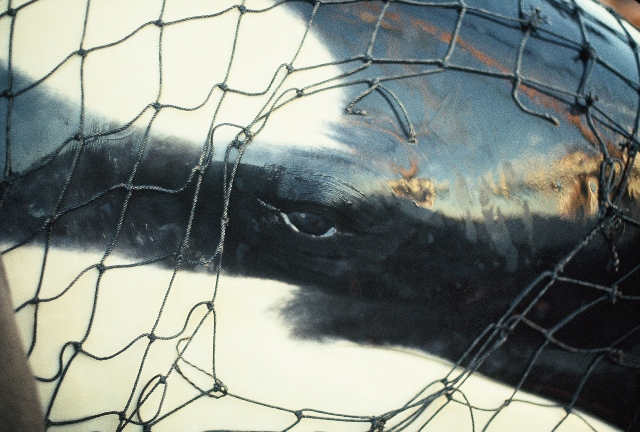

photo courtesy of Terrell Newby/Orca Network
New information continues to surface revealing the dark side of orcas in captivity, adding to the growing body of evidence condemning the continued confinement of orcas and focusing necessary attention on a practice that remains on trial even as the hearing between SeaWorld and OSHA takes a break until November 15th when the proceedings will resume in Sanford, Florida near Orlando.
As SeaWorld prepares for the next round of hearings in which it will continue to defend itself against charges by the Occupational Safety & Health Administration (OSHA), The Orca Project (TOP) has released a new video that reveals the differences between life for killer whale families in the wild and in captivity. Focusing on the forced separation of orca mothers and their calves as families are literally torn apart for captivity, not only during captures from the wild, but as a result of transferring orcas between facilities, the video offers a heart-wrenching glimpse into the realities behind captivity.
The video, entitled A Better Way to See Orcas, can be found at www.youtube.com/watch?v=0mVghxxBBqo. The video was prepared by Leah Lemieux, author of the book Rekindling the Waters, and Dr. Lori Marino, neuroscientist at Emory University, who has studied dolphins and whales for over twenty years.
WDCS is working to share the cruel stories behind captivity, including the devastation that captivity perpetuates among orca families, including those who are captive-born. A full listing of the broken bonds between orca mothers and their children can be found here
And thanks to the courage of former SeaWorld trainers, details continue to surface that provide detailed information regarding the chronic stress that captive orcas endure, exacerbated by and inextricably linked to the poor dental condition and chronic infections that occur in captivity and require constant regiments of antibiotics, and perhaps also contribute to their aggressive tendencies and shortened lives in captivity.
WDCS recently reported newly discovered documentation regarding the cause of death of an orca (Kanduke) that occurred over twenty years ago in 1990 at SeaWorld Orlando due to an encephalitis virus transmitted through a mosquito bite.
Shockingly, new information has surfaced revealing that another captive orca death was tied to a different virus also transmitted through a mosquito bite. In 2007, a 14-year-old male orca held at SeaWorld San Antonio, Taku, died suddenly and without any notable warning signs. Upon examination, it was found that he had been fatally infected with the West Nile Virus which is transmitted by mosquitoes.
Because of the perpetual logging behavior of captive orcas at the surface of their shallow pools, they are susceptible to diseases carried by biting insects. This important information reveals that the premature death of orcas in captivity is caused by a variety of stressors unique to the captive environment, further supporting our claims that orcas do not belong in captivity.
As the compelling evidence regarding the formerly unseen and devastating realities behind orcas in captivity continues to mount, WDCS encourages the public to make the right choice: please donít buy a ticket to a marine park that keeps whales and dolphins in captivity. Be a part of the solution, not the problem. Orcas do not belong in captivity, and it is time for the public to a demand an end to their confinement for our entertainment.
There is a better way to see orcas, and that is in the wild, in their natural environment, and with their families intact.